Counter season vegetables help improve women's lives in north-western Vietnam
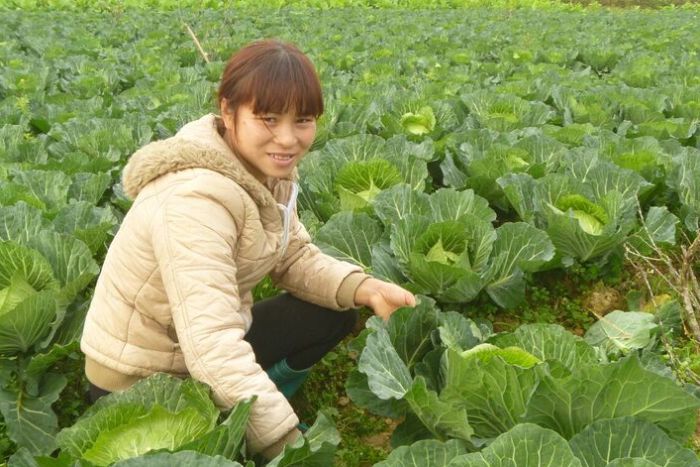
Vang Thị Huong harvesting cabbages from her farm in Na Kheo Commune, Bac Ha District, Vietnam before the Sunday market. (ABC Rural: Cassandra Hough)
Women and ethnic minorities in north-western Vietnam are improving their farming practices and boosting their incomes thanks to an Australian aid project.
A $2.3 million Australian Centre for International Agricultural Research (ACIAR) project is addressing the need to reduce poverty and improve nutrition there through boosting vegetable production.
Vàng Thị Hường is a mother of three children and she farms in the Nah Keo commune high in the mountains of Vietnam's Bac Ha district.
Rice is the staple crop in the region but her cabbage, kohlrabi, cauliflowers and native leafy vegetables, such as cai meo, are increasingly important to her income.
"Most of them have the same prices so in terms of economics it's the same with every variety but to her the most important crop is cabbage because she still can sell the cabbage and she can utilise the old leaf of the cabbage to feed the animals," Ms Vàng said through a translator.
The cool climate of Lao Cai province means the region is only able to produce one rice crop a year.
But the temperate weather presents an opportunity for the small landholders to produce vegetables at a different time of the year to the higher producing, more developed regions in Vietnam such as the Red River Delta, around Hanoi.

Lu Thị Cọt sells her vegetables in the Sunday Market, Bac Ha, Lao Cai Province, Vietnam (ABC Rural: Cassandra Hough)
Growing counter-season vegetables
ACIAR has funded the project for the past four years.
There have been four components looking at everything from agronomic and farm management projects improvements to boosting supply chains and providing more market information to the farmers.
For farmer Lù Thị Cọt by learning more about growing the crops and fertilising them her income has doubled because she is now producing bigger and better quality cabbages.
"Before the winter crop then every crop I earn five to six million dong, and now it's only about half of the season and I already have 10 million dong [around $560] with more vegetables to sell," Ms Lù said through a translator.
The teachers encouraged them to sell off-season vegetables with higher margins so next year she wants to have vegetables to sell into May.
A key part of the project was improving soil nutrition and finding ways to manage problems such as the destructive club root pathogen that can sometimes destroy entire crops of cabbages.
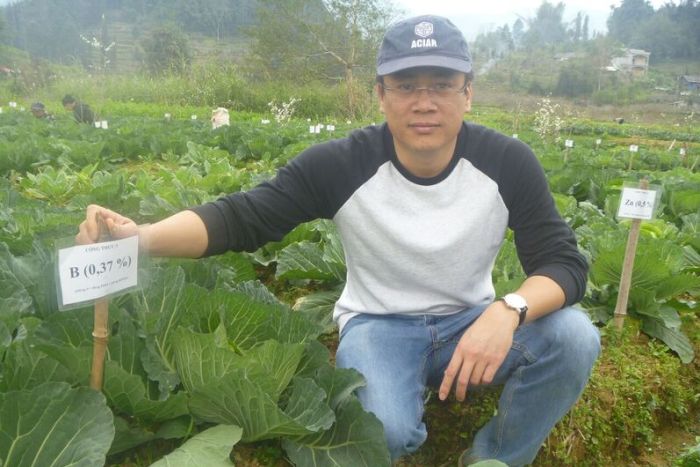
Dr Tran Minh Tien, deputy director of the Soils and Fertilisers Research Institute (in Hanoi) pictured in one of the project's micronutrient trials in Na Kheo Commune, Bac Ha District, Lao Cai Province, Vietnam. (ABC Rural: Cassandra Hough)
Dr Tran Minh Tien is the deputy director of the Soils and Fertilisers Research Institute in Hanoi.
He headed up the component of the project that looked at nutrition management and plant protection and helped provide technical support for farmers in the field.
"You know that in this area the women are responsible for the cultivation in the field and in our training the main participants are women," Dr Tran said.
"We were impressed because they learned how to face the issues in the future and they linked together to help each other."
Addressing poverty
The Lao Cai province of Vietnam is famous for its emerald green terraces etched into the side of mountains, but it is still one of the poorest regions in the country.
Keeping these staple crops healthy is particularly important in the Lao Cai province because about 40 per cent of people there live below the poverty line, and that number is even greater in the ethnic minority communities.
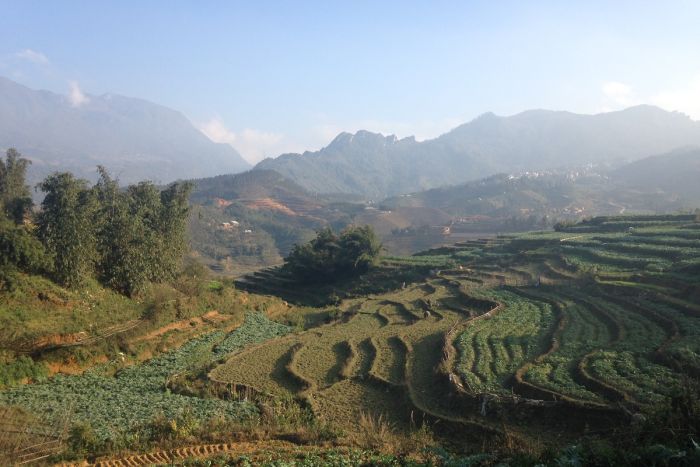
Terraced agriculture near Sa Pa in north western Vietnam. (ABC Southern QLD: Cassandra Hough)
Centre for Global Food and Resources at the University of Adelaide research associate Nikki Dumbrell said by improving the way vegetables were grown and sold helped ensure food security for these people, with a particular focus on women.
"Women are typically the people who are spending the time in the field weeding the vegetables, and tending to the vegetables, harvesting the vegetables and then taking them to the local market to sell," Ms Dumbrell said.
"When you go to the market nearly everyone selling vegetables is female so we're really looking at working with these ethnic minority communities and the women in these communities to improve their farming systems."
To do this the researchers paired up with the Vietnamese Women's Union (VWU) which has 15 million members.
The VWU is responsible for protecting the rights of women, building women's capacity and working towards gender equality.
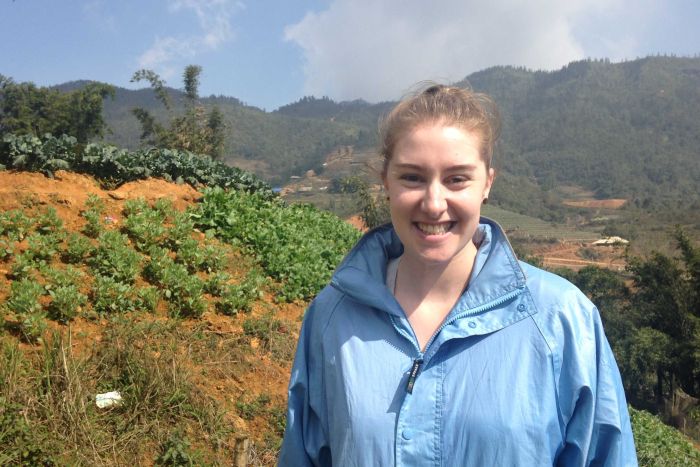
Research Associate at The University of Adelaide's Centre for Global Food and Resources Nikki Dumbrell in the field in Ma Tra Commune, Sa Pa District, Vietnam (ABC Rural: Cassandra Hough)
Hien Nguyen is a Vietnamese Women's Union officer and she was a coordinator of the project before she received a John Allright Fellowship from ACIAR to study for her Master's degree in women's studies at Flinders University in Adelaide.
She has seen firsthand how the project is helping women in Vietnam.
"Participating in the project women have more chance to engage to the wider community, they become more confident," Ms Nguyen said.
"I see them very active in all kinds of group discussion, such as developing production and business plans or discussing the technical constraints to the production and discussing the solution with the project expert."
The H'mong people are an ethnic minority group known for being quite conservative with the men taking the lead in almost all activities.
"At the start of the project only men represent the families involved in the project but then under the encouragement and the activity of the project many women are now involved," Ms Nguyen said.
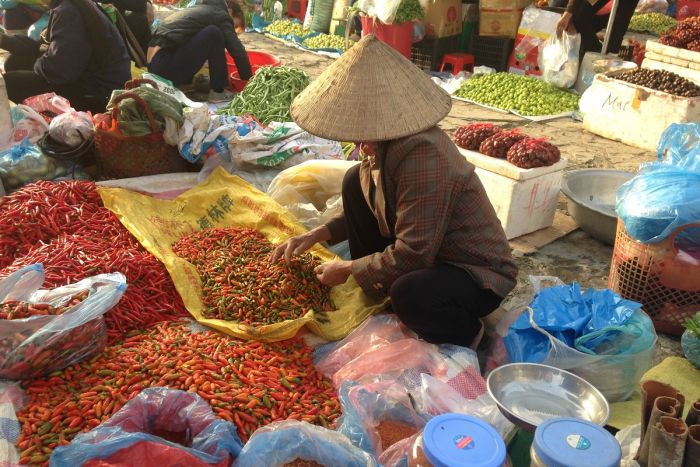
A woman selling chillies on the streets of the Bac Ha markets in north-western Vietnam. (ABC Southern Qld: Cassandra Hough)
Money well spent?
Nikki Dumbrell said Vietnam had a population of 90 million people and was becoming an increasingly important trading partner and as a result the increased collaboration helped both countries.
"Vietnam is a major trading partner of Australia. If we work together on scientific knowledge or awareness of disease issues or pest issues or post-harvest issues we can be a little more confident that we can work on issues together and come up with solutions that help both countries which face similar challenges in this space," she said.
"If we are importing fruit and vegetable products or whatever from Vietnam we may be more confident that there are more biosecurity concerns being taken care of before those products enter our country."
Like many farmers across the world much of the extra money generated by the improved farming and marketing techniques is being invested back into their farms to improve their operations and continue earning more money.
But it's also allowing the women like Vàng Thị Hường contribute directly to improving the lives of their children.
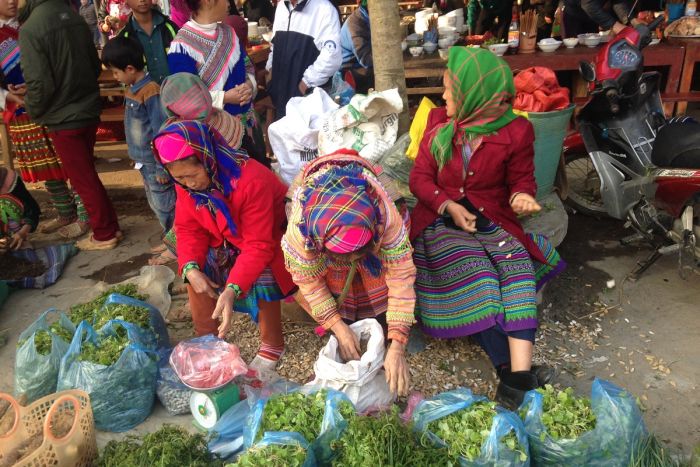
Three women selling herbs at the bustling Bac Ha markets in north-western Vietnam. (ABC Southern Qld: Cassandra Hough)
"The project encouraged the participants to plant more diverse varieties so she has more varieties on the field so with the help of the technical support the yield of her farm also increased," Ms Vàng said.
"By selling the vegetable it helps her as a mother to finance her children's tuition fees, before the tuition fee was in charge mainly by the husband so the salary of the husband is for the tuition fee but now she can buy more snacks for her children and she can now pay the tuition fee for her children without relying on the husband's salary."
Newer news items:
Older news items:
- Fruit and vegetable exports hit new record - 11/07/2018 08:09
- Vietnam first in line to export rambutans to New Zealand - 12/06/2018 08:09
- Fruits and Vegetables Research Institute 2014 - 03/02/2018 05:07
- Scientific Conference Fruit and Vegetable Research Institute 2013 - 03/02/2018 04:56
- Science Conference Vegetable Research Institute 2017 - 03/02/2018 04:50